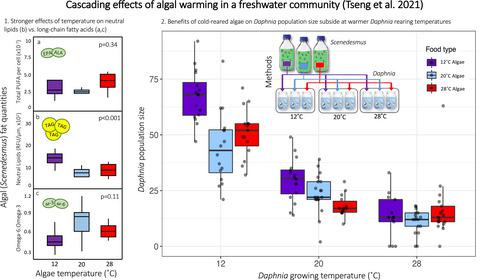当前位置:
X-MOL 学术
›
Funct. Ecol.
›
论文详情
Our official English website, www.x-mol.net, welcomes your
feedback! (Note: you will need to create a separate account there.)
Cascading effects of algal warming in a freshwater community
Functional Ecology ( IF 4.6 ) Pub Date : 2021-01-11 , DOI: 10.1111/1365-2435.13752 M. Tseng 1 , C.M. Di Filippo 2 , M. Fung 1 , J.O. Kim 1 , I.P. Forster 3 , Y. Zhou 1
中文翻译:

淡水群落中藻类变暖的级联效应
更新日期:2021-01-11
Functional Ecology ( IF 4.6 ) Pub Date : 2021-01-11 , DOI: 10.1111/1365-2435.13752 M. Tseng 1 , C.M. Di Filippo 2 , M. Fung 1 , J.O. Kim 1 , I.P. Forster 3 , Y. Zhou 1
Affiliation

|
- Research on the effects of climate warming on ecological communities has focused on how temperature affects resource quantity. However, resource quality is also affected by warming, and changes in resource quality can have meaningful effects on the productivity of higher trophic levels.
- Aquatic communities in particular experience temperature‐mediated shifts in resource quality because the nutritional value of algae is highly sensitive to temperature. For example, the production of healthful omega‐3 polyunsaturated fatty acids (n‐3 PUFA) by algae often decreases with warming.
- Decreased levels of some algal PUFAs with warming have led to the hypothesis that global warming should lead to an overall decrease in productivity in aquatic communities. However, this hypothesis: (a) potentially oversimplifies the relationship between algal PUFAs and temperature, and (b) assumes that the nutritional requirements of consumers are not affected by temperature. Here, we test these assumptions using a freshwater community (Scenedesmus algae, Daphnia zooplankton, Chaoborus insects).
- Warming temperatures increased total algal PUFAs, but decreased algal cell size, resulting in no net effect of temperature on PUFA per algal cell. In contrast, quantities of algal neutral lipids decreased with warming. At the consumer level, Daphnia fed 12°C‐reared algae maintained higher population sizes than those fed 20°C or 28°C‐reared algae. However, the effect of algal food type diminished as Daphnia rearing temperature increased. The indirect effects of cold‐reared algae on the growth rate of Chaoborus predators were minor.
- These data highlight the importance of investigating the effects of temperature on both resource quality and on the nutritional needs of consumers. Our results suggest that at warmer temperatures, consumer nutritional requirements may be reduced. We caution against broad claims that the negative relationship between some algal PUFAs and temperature should result in overall declines in aquatic productivity with ongoing climate warming.
中文翻译:

淡水群落中藻类变暖的级联效应
- 关于气候变暖对生态社区影响的研究集中在温度如何影响资源数量上。但是,资源质量也受到变暖的影响,资源质量的变化可能对较高营养级别的生产力产生有意义的影响。
- 由于藻类的营养价值对温度高度敏感,水生社区尤其会经历温度介导的资源质量变化。例如,藻类产生的健康的omega-3多不饱和脂肪酸(n-3 PUFA)的产量通常会随着变暖而减少。
- 随着增温,某些藻类PUFA的含量降低,导致了这样的假设,即全球变暖应导致水生社区的生产力整体下降。但是,该假设为:(a)可能过度简化了藻类PUFA与温度之间的关系,并且(b)假设消费者的营养需求不受温度的影响。在这里,我们测试使用的淡水社区(这些假设栅藻的藻类,水蚤浮游动物,Chaoborus昆虫)。
- 升温温度增加了总藻类PUFA的含量,但减少了藻类细胞的大小,从而导致温度对每个藻类细胞的PUFA没有净影响。相反,藻类中性脂质的数量随着变暖而减少。在消费者水平上,喂食12°C的藻类的水蚤保持的种群数量高于喂食20°C或28°C的藻类的种群。然而,藻类食物的影响随着水蚤饲养温度的升高而减弱。冷养藻类对潮虫捕食者生长的间接影响很小。
- 这些数据突出了调查温度对资源质量和消费者营养需求的影响的重要性。我们的结果表明,在较高的温度下,消费者的营养需求可能会减少。我们告诫不要大声宣称,某些藻类PUFA与温度之间的负相关关系会导致随着气候变暖而导致水生生产力总体下降。









































 京公网安备 11010802027423号
京公网安备 11010802027423号